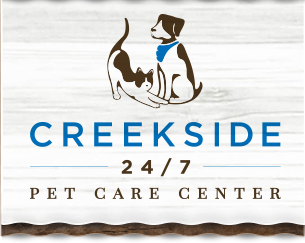CREEKSIDE’S SCHEDULE FOR DOG VACCINATIONS
We recommend all puppies start visiting Creekside Pet Care Center once they turn six weeks old and continue to do so every two to four weeks until they are 16 weeks old. These visits enable us to ensure your canine friend is fully protected from disease. At Creekside, puppies receive vaccine boosters every three to four weeks until they reach 16 weeks of age, then annually. Once they reach maturity, they will be the vaccine schedule below:
- Bordetella vaccine – Every six months
- Leptospirosis vaccine – Annually
- DAPP – (Canine Distemper) – Every 3 years
- Rabies – Every 3 years
If your fur-baby is not up to date on his or her dog vaccines and heartworm prevention, call 1-800-My-Pet-Care or book an appointment online today. We’ll be happy to answer any questions you may have regarding our dog vaccination protocol and preventative care.
CREEKSIDE’S SCHEDULE FOR CAT VACCINATIONS
Creekside’s veterinarians recommend all kittens begin visiting our facility once they turn six weeks old and continue to do so every two to four weeks until they are 16 weeks old. These visits help us fully protect your cat from various species-specific diseases. At Creekside Pet Care Center, all kittens receive vaccine boosters every three to four weeks until they reach 16 weeks of age, then annually. Once they reach maturity, they will be on the vaccination schedule below:
- Rabies – Annually
- FVRCP (Feline Distemper) – Every 3 years
- Feline Leukemia – Every 3 years for adult cats who are at risk. Indoor/outdoor cats are at greater risk, as are cats who are exposed to another cat in the house that is an indoor/outdoor cat.
If your feline is not up to date on his or her cat vaccinations and heartworm preventatives, call 1-800-My-Pet-Care or book an appointment online today. We’ll be more than happy to answer any questions you may have about Creekside’s cat vaccination protocol and preventative care.
At Creekside Pet Care Center in Keller, we’re dedicated to caring for your pet when they’re sick, but we would rather prevent your pet from getting sick altogether, if possible! Having your pet vaccinated on a routine basis can easily protect them from various infections and keep them healthy all year round. We offer dog vaccinations and cat vaccinations, because many diseases are species-specific, and affect our pets differently.
Our hospital recommends that adult pets see us for wellness appointments annually. However, depending on your pet’s overall health history and age, we can create a tailored vaccination plan just for them.
Why Pet Vaccinations are Important
Dogs and cats of every age, size, and lifestyle can all be at risk for disease to a certain extent. Even indoor-only pets can be vulnerable if they are not vaccinated. Airborne viruses can easily pass through an open window or door or affect your pet when they go outside even for just a few minutes. You or another human family member can also unknowingly carry a virus into your home from outside. Direct contact with an infected animal is not always needed to spread disease.
Furthermore, some animal diseases can be fatal. Rabies is the most well-known lethal virus, but canine distemper and feline immunodeficiency virus can also be deadly.
Vaccines We Recommend for Dogs and Cats in Keller, TX
Below are our recommended vaccines for dogs and cats.

Dog Vaccines
The DAPP vaccine protects against canine distemper, adenovirus, parainfluenza, and parvovirus. We recommend starting your pet on this vaccine when they are 6-8 weeks old (if possible) and having them boosted every 3-4 weeks until they are 16 weeks old. After that last puppy shot, your dog should be vaccinated for DAPP one year later, and then every 3 years after that for the remainder of their life.
Bordetella, or kennel cough, is a contagious, airborne virus of the upper respiratory system. It is most easily spread in dog kennels, dog parks, daycare centers, and dog salons. We give the Bordetella vaccine intranasally (through the nostrils) during the first puppy visit, and then give an injectable version of the vaccine 3-4 weeks later. After that, we can rotate your pet’s boosters between injectable and intranasal.
Our leptospirosis vaccine protects dogs against the leptospirosis (or lepto) infection, transmitted by disease-causing bacteria found in bodies of water and in damp soil. Lepto affects the liver and kidneys and can be deadly if it isn’t treated. In addition to affecting dogs, lepto can also infect humans. Wild animals typically shed the bacteria in their urine and feces, and your pet can get infected if they come into contact with it. Dogs should be immunized for leptospirosis on a yearly basis after getting their first two doses three weeks apart.
Because the rabies virus is so deadly to animals and humans, the rabies vaccine is required by law for all domesticated dogs. Your puppy will receive their first rabies shot at about 12 weeks old, their booster one year later, and then subsequent boosters every 3 years thereafter. Rabies targets the brain and spinal cord, causing seizures, paralysis, and then death. Make sure your pet never goes without protection from this lethal disease.
Every dog should have full, year-round protection against heartworm disease, which is spread by mosquitoes. Heartworms themselves are parasitic roundworms, which travel through your pet’s bloodstream as larvae and grow into adults while living in the arteries around the heart and lungs. Treatment is possible for dogs, though it is time-consuming, uncomfortable, and costly. Prevention is key.
At Creekside, we recommend having your dog tested for heartworms every year and maintaining a monthly heartworm prevention regimen due to the fact that this part of Texas is an endemic area for heartworms.
Canine influenza (CIV) is a contagious virus that can be spread via nasal secretions, barking, coughing, and contact with contaminated animals, people, and surfaces. CIV, which comes in two strains (H3N2 and H3N8), affects the upper respiratory system. We can vaccinate your dog to protect them against both strains of CIV
Cat Vaccines
Rabies is just as deadly for cats as it is for dogs. Your kitten should receive their first rabies vaccine at 12 weeks old, followed by yearly boosters with the Purevax® form of the rabies vaccine for maximum protection.
The FVRCP vaccine is a combination vaccination sometimes referred to as the “feline distemper” vaccine. It protects your cat against feline viral rhinotracheitis, calicivirus, and panleukopenia. Because these diseases are so contagious and cause so many problems for feline gastrointestinal and respiratory systems, vaccination is essential to your cat’s health and safety. Your kitten should get their first FVRCP vaccine at 6-8 weeks old, every 3-4 weeks until they are 16 weeks old. Your cat will then need their next booster a year later, then once every three years thereafter.
FeLV affects the feline immune system. It can be deadly, and cause various types of cancer, including leukemia. Worse, symptoms of this disease may not be apparent for months or even years. This can make it all too easy for the infected cat to infect others. Your cat should receive their first FeLV vaccine at around 9 weeks old, followed by a booster after their second set of immunizations, and then a year later. After that, your cat should be booster every 3 years.
Cats infected with heartworms cannot be treated, and for many, the condition is life-threatening. Both indoor and outdoor cats can be at risk for infection, especially since mosquitoes can easily slip through a window screen or door crack. A study recently showed that a quarter of all heartworm-positive cats in Texas are actually indoor cats! Thus, we strongly encourage monthly heartworm preventative for all cats.
Our hospital offers a topical medication to prevent heartworm disease, so you don’t have to stress about giving your cat pills!

CREEKSIDE’S SCHEDULE FOR DOG VACCINATIONS
We recommend all puppies start visiting Creekside Pet Care Center once they turn six weeks old and continue to do so every two to four weeks until they are 16 weeks old. These visits enable us to ensure your canine friend is fully protected from disease. At Creekside, puppies receive vaccine boosters every three to four weeks until they reach 16 weeks of age, then annually. Once they reach maturity, they will be the vaccine schedule below:
- Bordetella vaccine – Every six months
- Leptospirosis vaccine – Annually
- DAPP – (Canine Distemper) – Every 3 years
- Rabies – Every 3 years
If your fur-baby is not up to date on his or her dog vaccines and heartworm prevention, call 1-800-My-Pet-Care or book an appointment online today. We’ll be happy to answer any questions you may have regarding our dog vaccination protocol and preventative care.
CREEKSIDE’S SCHEDULE FOR CAT VACCINATIONS
Creekside’s veterinarians recommend all kittens begin visiting our facility once they turn six weeks old and continue to do so every two to four weeks until they are 16 weeks old. These visits help us fully protect your cat from various species-specific diseases. At Creekside Pet Care Center, all kittens receive vaccine boosters every three to four weeks until they reach 16 weeks of age, then annually. Once they reach maturity, they will be on the vaccination schedule below:
- Rabies – Annually
- FVRCP (Feline Distemper) – Every 3 years
- Feline Leukemia – Every 3 years for adult cats who are at risk. Indoor/outdoor cats are at greater risk, as are cats who are exposed to another cat in the house that is an indoor/outdoor cat.
If your feline is not up to date on his or her cat vaccinations and heartworm preventatives, call 1-800-My-Pet-Care or book an appointment online today. We’ll be more than happy to answer any questions you may have about Creekside’s cat vaccination protocol and preventative care.



